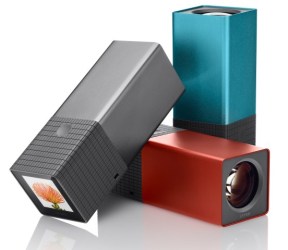We were recently able to pose a few questions to Ren Ng, founder and CEO of Lytro, and the person upon whose research the whole product is based. Their camera, which allows the shooter to set the focus after taking the shot, among other things, is launching soon. But there is still much to learn about it, as the company has been fairly close-mouthed about its specs and capabilities.
First, Ng declined to name the supplier for the lens, an 8x zoom with a fixed F/2 aperture — that’s serious glass, and they’re keeping their source secret. The striking design is actually necessitated by the lens; most zooms that size will protrude from the body of a camera owing to certain optical necessities, but Lytro’s is all-internal, and to keep the whole thing compact the rest of the camera was built around the lens.
The “light ray” technology behind the camera is also potentially usable for video. The trouble is that processing that much image data might not be possible at the moment, given how differently the Lytro handles data. But if you take away that processing roadblock, there doesn’t seem to be any reason why video should be taken off the table. But for the debut, still photography is the only worthwhile thing to target, since the market is so much bigger and the tech supports it right now.
We also asked about wireless capability. The chipset used on the Lytro is listed as being both Wi-Fi and Bluetooth capable, but no wireless syncing or direct-to-Facebook type functions have been mentioned at all. The only thing Ng would say was that they were hard at work on the wireless piece. It doesn’t seem too far out there to expect an update to the Lytro that will add some basic wireless functionality, but for now all we know is it’s being considered.
They seem to be open to licensing the technology or partnering with other services, possibly for co-branding purposes. But at the moment the focus is on just getting the product out there. Other means of monetizing or spreading the technology may be resorted to later, especially if (perish the thought) the camera sells less than expected.
